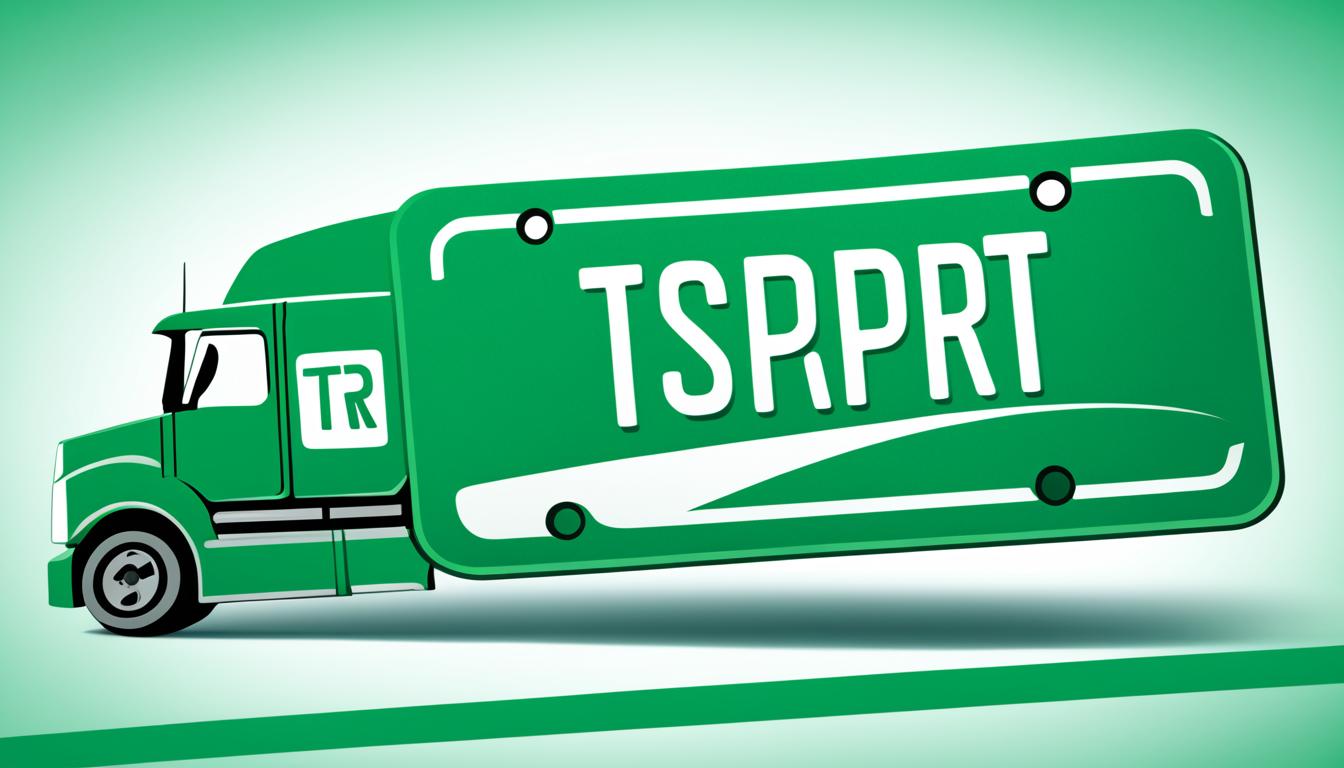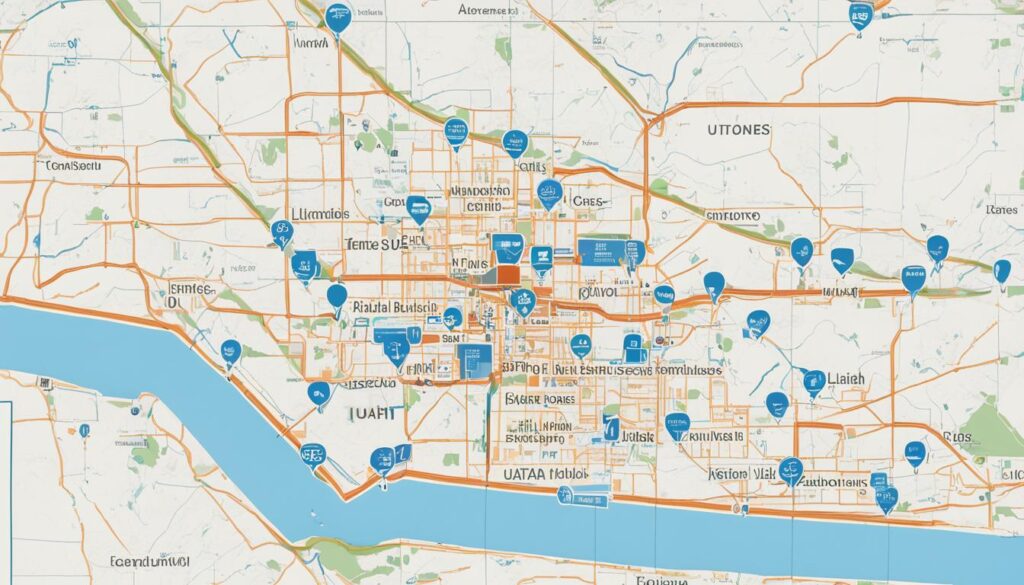Did you know that starting a transport business involves obtaining multiple licenses and permits? It’s not just a single license that encompasses everything. The process can be complex and overwhelming, but understanding the specific license requirements for your type of transport business is crucial.
Key Takeaways:
- Starting a transport business requires obtaining specific licenses and permits.
- Failure to comply with license requirements can lead to penalties and license suspension.
- Motor carrier businesses need to register for a USDOT number and obtain operating authority.
- State-administered registrations, such as motor carrier permits and CDL requirements, are also necessary.
- The FMCSA registration process involves obtaining a USDOT number, operating authority, and meeting insurance requirements.
Overview of Motor Carrier License Requirements
Transport businesses that provide motor carrier or freight brokerage services are subject to specific registration and licensing requirements at both the federal and state levels. Meeting these requirements is essential to ensure compliance with regulations and operate legally. Let’s take a closer look at the key motor carrier license requirements:
1. United States Department of Transportation (USDOT) Number Registration

The first step in obtaining the necessary licenses for your motor carrier business is registering for a USDOT number. This unique identifier is required for interstate carriers and may also be mandatory for some intrastate carriers depending on the state’s regulations. Registering for a USDOT number involves completing an application with the Federal Motor Carrier Safety Administration (FMCSA) and providing relevant business information.
2. Operating Authority
Operating authority is another crucial requirement for motor carriers and freight brokers. It grants businesses the legal authorization to transport passengers or cargo across state lines. The FMCSA issues different types of operating authority based on the specific services offered by the business, such as common carrier authority, contract carrier authority, or broker authority. Compliance with these regulations ensures that your business operates within the boundaries of the law.
By meeting motor carrier license requirements, such as securing a USDOT number and obtaining operating authority, your transport business will be well on its way to operating legally and effectively in the industry.
State Administered Registrations
In addition to federal registrations, motor carriers must comply with various state level registrations and permits in order to operate legally. These state administered registrations serve to ensure compliance with local regulations and facilitate the efficient movement of goods across state lines.
Here are some of the key state administered registrations that motor carriers need to be aware of:
State Motor Carrier Permit/Registration
A state motor carrier permit or registration is a mandatory requirement in most states. This permit or registration allows motor carriers to operate within the state and ensures that they meet certain safety standards and insurance requirements.
Unified Carrier Registration (UCR) Program
The Unified Carrier Registration (UCR) program is a federal-state partnership that requires interstate motor carriers, brokers, and freight forwarders to register and pay an annual fee based on the size of their fleet. The UCR registration helps fund state enforcement agencies and allows motor carriers to operate across state lines.
International Registration Plan (IRP) Registration
The International Registration Plan (IRP) is a reciprocal agreement among most states, Canadian provinces, and the District of Columbia that allows commercial vehicles to travel across jurisdictions with a single license plate and registration. Motor carriers operating in multiple jurisdictions need to register under the IRP to ensure compliance.
International Fuel Tax Agreement (IFTA) Permit
The International Fuel Tax Agreement (IFTA) permits motor carriers to report and pay fuel taxes based on the number of miles traveled in each participating jurisdiction. This permit simplifies the reporting and payment of fuel taxes for carriers operating in multiple states or provinces.
Commercial Driver’s License (CDL)
Motor carriers need to ensure that their drivers hold a valid Commercial Driver’s License (CDL) that is appropriate for the type and weight of the vehicles they operate. CDL requirements vary by state but generally involve written and practical tests to assess a driver’s knowledge and skills.
By obtaining these state administered registrations and permits, motor carriers can navigate the complex regulatory landscape and operate their businesses legally and efficiently.
FMCSA Registration Process
Registering with the Federal Motor Carrier Safety Administration (FMCSA) is a necessary step for commercial trucking companies and those involved in hauling cargo. To ensure compliance with federal regulations, the registration process consists of several key requirements:
- Obtaining a USDOT number: Every commercial motor carrier operating in the United States must have a unique USDOT number. This number serves as an identifier for auditing and compliance purposes. Applying for a USDOT number can be done online through the FMCSA’s website.
- Demonstrating operating authority: Depending on the type of operation and the cargo being transported, commercial trucking companies need to demonstrate the appropriate operating authority. This authority specifies the scope of their operations and the types of cargo they are authorized to transport. Operating authority can include interstate or intrastate authority, as well as authority for specific types of transportation services, such as passenger or hazardous materials. The FMCSA provides detailed guidance on the necessary documentation and forms required to demonstrate operating authority.
- Designating a process agent: As part of FMCSA registration, carriers are required to designate a process agent. A process agent is a representative who can accept legal documents on behalf of the carrier in each state where the carrier operates. This ensures that carriers can be properly served with legal notices and demands. Carriers can appoint a process agent by completing the appropriate form provided by the FMCSA.
- Meeting insurance requirements: Commercial trucking companies must meet specific insurance requirements to fulfill FMCSA registration. The FMCSA sets minimum insurance levels to protect the public and ensure carriers have adequate coverage in the event of an accident or loss. Carriers must provide proof of insurance coverage as part of the registration process.
By completing the FMCSA registration process, including obtaining a USDOT number, demonstrating operating authority, designating a process agent, and meeting insurance requirements, commercial trucking companies can legally operate and ensure compliance with federal regulations.

Additional Federal and State Licenses, Permits, and Registrations for Trucking
When operating a trucking business, it’s important to be aware of the additional licenses, permits, and registrations required at both the federal and state levels. These additional requirements ensure compliance with specific regulations and help streamline operations.
Unified Carrier Registration (UCR) License
The Unified Carrier Registration (UCR) license is necessary for motor carriers operating in interstate commerce. It is an annual registration that helps fund state registration programs.
FMCSA Hazardous Materials Safety Permit
If your trucking business transports hazardous materials, you will need to obtain an FMCSA Hazardous Materials Safety Permit. This permit ensures compliance with safety regulations and helps protect public safety.
Pipeline and Hazardous Materials Safety Administration (PHMSA) Registration
In addition to the FMCSA permit, trucking businesses involved in the transportation of pipeline and hazardous materials are required to register with the Pipeline and Hazardous Materials Safety Administration (PHMSA). This registration helps regulate the safe transportation of these materials.
International Registration Plan (IRP) License Plate
For trucking businesses operating in multiple jurisdictions, an International Registration Plan (IRP) license plate is necessary. This registration allows vehicles to travel across states and provinces while complying with registration requirements.
International Fuel Tax Agreement (IFTA) Permit
The International Fuel Tax Agreement (IFTA) permit is essential for motor carriers to report and pay fuel taxes when operating in multiple jurisdictions. This permit simplifies tax reporting and ensures compliance with tax regulations.
Form 2290 – Heavy Highway Use Tax
Trucking businesses that operate heavy vehicles weighing 55,000 pounds or more need to file Form 2290 for heavy highway use tax. This tax is used to maintain and improve the highway infrastructure.
Standard Carrier Alpha Code (SCAC)
The Standard Carrier Alpha Code (SCAC) is a unique identifier assigned to motor carriers engaging in interstate or international commerce. This code is necessary for various shipping transactions and helps streamline operations.
State Trucking Regulations and Miscellaneous State Requirements
Each state has its own set of trucking regulations that motor carriers must follow. These regulations may include specific permits, weight restrictions, hours of service rules, and other requirements. It’s crucial to familiarize yourself with these regulations to ensure compliance with state laws.
Meeting all federal and state licensing, permit, and registration requirements is essential for operating a trucking business legally and efficiently. Failure to comply with these requirements can result in penalties, fines, and the suspension of your operations.
Requirements for Doing Business
When starting a transport business, it’s important to fulfill not only the specific licensing requirements but also the general requirements for doing business. These requirements ensure that you are operating legally and avoid any potential penalties.
The first step is to form a legal entity for your business, such as an LLC or corporation. This provides personal liability protection and allows you to separate your personal and business assets.
Next, you need to obtain a basic business operation license that authorizes you to conduct your transport business in the desired location. Additionally, you must obtain both federal and state tax ID numbers to comply with tax regulations and accurately report your earnings.
If you plan to operate under a fictitious business name, also known as a DBA (Doing Business As), it’s necessary to register it with the appropriate authorities. This allows you to conduct business using a name other than your legal entity name.
Before you can start operating, you’ll need to acquire the necessary zoning permits to ensure that your business location is compliant with local regulations. If any construction or remodeling is involved, obtaining a building permit is also essential.
Lastly, if you have employees, it’s crucial to obtain workers’ compensation insurance. This insurance protects both your employees and your business in the event of work-related injuries or illnesses.
By fulfilling these requirements, you can operate your transport business legally and confidently, paving the way for success in the industry.




